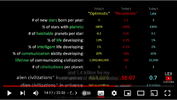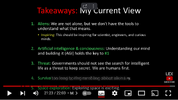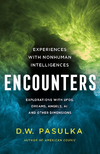I finished the book last night. I didn’t like it overall and my overall feeling about the book is that the reader is an outsider looking in and the author doesn’t provide enough data, information, and explanation for the reader to have a full picture of what was and is going on and thus the book really ends up keeping the reader on the outside and left hanging.
Take as an example the artifact discussion near the end. That kind of came out of left field without really any detailed information about it. Is she talking about the artifact that James first found or the other one that she and Tyler found. It seemed to me to read at the end that she might be talking about the second one. Regardless, it left me more agitated about the book, since there wasn’t much information, than wondering about the supposed artifact.
Another example is her calling Tyler an American hero. I can’t really determine why she says this. Ok he worked for NASA and he invented things that seem to help people, but she just doesn’t provide enough information and explanation, IMO, for such a statement. Maybe she wanted to try to respect him being an ‘invisible’, as she calls him and James, and therefore doesn’t provide information.
A final example is that she referred to ‘the phenomenon’ in the book a number of times, but doesn’t give a detailed explanation of what exactly this is other than ambiguously linking it to communicating with or relating it to a person's DNA being a receiver of sorts for inspiration from off-planet intelligence. And she doesn't really develop in depth and provide information about what she sees as the off-planet intelligence.
Something that did pique my interest was it was mentioned in the book that Tyler needed to be at a location for something to work, but not much information is given.
pg 180 said:
Tyler believes that human beings are designed to interface with the phenomenon, but only under certain conditions, and some human beings are better able to “connect” than others. I knew that Tyler had a unique job, and I learned that part of the job description was that he was to be placed in certain locations. Apparently, Tyler’s mere presence was supposed to facilitate certain required events and processes.
Before starting this book, I had begun reading off and on the book ‘The PK Man’ by Jeffrey Mishlove. In the beginning of that book the author describes how Ted Owens seemed to influence things like weather on location when he had made predictions about such things. Like his presence might be necessary for the prediction to come true. And Ted Owens talked about being in contact with, helped by, and able to get ‘aliens’ to act on his behalf. Figure I will read ‘The PK Man’ book next in full, since there seems like there might be some similarities between Tyler and Ted Owens.
Like DeSouza the author could use some exposure and understanding about 4D STS and how malevolent and manipulative such beings can be.
As an example, she doesn’t side one way or another about the ‘aliens’/’angels’ being good or bad that healed the dog when a woman prayed all night for help. When the dog was healed it seemed like it could be an interaction with 4D STS, even though the dog was healed. I think a realistic take on the event given our perspective is that 4D STS healed the dog toward some other overall plan or objective, such as influencing and using the husband and wife. Yet, I think the story and how much the husband’s life was changed influenced the author to see it as a positive, the ‘aliens’/’angels’ as a positive.
She had also had reported this about the husband:
pg 212 said:
(…) At the time the episode aired, Rey had already begun to receive the first round of data compiled by his organization. His dataset included over three thousand reports from people who claimed to have UFO-related experiences. Overwhelmingly, these experiencers reported positive interactions with non-human intelligence.
At the very end of the book she writes this and misses the chance to consider just what 'the predator' is and what it is capable of:
(…) As I opened the book, I was struck by Shklovsky’s words: “The prey runs to the predator.” This referred to the search for extraterrestrial life, of course. It suggested that if humans actually did meet such life, it might not be friendly. I came to understand these words in a different way. I related them to our relationship to media and technology and the unreflective embrace of both. As philosopher Martin Heidegger had predicted years earlier, technology would bring about a new era, an era as much dominated by technology as the medieval era had been dominated by God. Technology and its effects would be misunderstood. In this misunderstanding, Heidegger argued, humans would face a great and potentially very destructive crisis. In Heidegger’s last interview, the German magazine Der Spiegel asked if philosophy could prevent such a negative outcome. Heidegger answered: “Only a God can save us now.” At Heidegger’s request, the interview was only published posthumously.
From her writing this, if I had to guess, I’d say she would lean toward ‘aliens’ being good (or some of them) and being what people would term as angels or even the ancient gods.
It really reminded me of this exchange with the C’s and made me think that maybe the author does highlight some important things in her book about a new religion being formed related to UFOs and ‘aliens’ and how that has come about. She doesn’t say that it is on purpose, but we could see it that way. And that this new or budding religion with the influence that humanity has been under in terms of media and 70 plus years of Cointelpro is in preparation for the ‘aliens’/4D STS to be introduced as the saviors of humanity... and worshiped as the good guys.
14 Jan 2023 said:
(Gaby) Recently in the news it was reported that there have been over 350 reports mostly coming from military personnel, mostly within the past 2 years or so.
(Andromeda) UFO reports.
(Joe) Like an increase - a flap.
(Niall) Just in the last 2 years - since March 2021.
(L) A military UFO flap...
A: Main prep should be psychological and spiritual. As to appearance, nothing like what you would expect. Most will be done via proxies as invaders do not fit earth's FRV. [Review of answer] Some dramatic displays of power and control are possible.
Q: (Joe) Who are the proxies most likely to be from our perspective?
A: Heads of government who are "plugged in" or replacements.
Q: (Joe) The dramatic displays of power and control that are possible, who would they come from? I mean, who would be giving these dramatic displays of power and control?
(L) Dramatic displays coming from UFOs?
A: Yes
Q: (Joe) They said most of it will be done by proxies, i.e. human beings, and there'll be dramatic displays of power and control.
(L) Yeah, but then we read the answer and then they threw that last part in afterwards. So, it was like an additional note on the topic. Well, people who've researched it know that they've turned off all the missiles at some place in Montana or somewhere years and years ago.
(Joe) Does that imply a generalized awareness of aliens among the human population at some point?
A: Yes
Q: (L) Can you imagine what that's gonna be like? Even all of us sitting here, we've all been reading about it, thinking about it, and talking about it for 25-30 years. And yet, if and when they ever actually came out and said, "Hi guys! Here we are!" We'd probably all go into some kind of panic attack.
(Joe) I'd be gettin' my gun!
(L) Well, I mean, c'mon! We've been programmed all our lives to think such things don't exist. It's all just a conspiracy theory. But all the conspiracy theories have been coming true! OMG!
(Andromeda) I know. And even when you know about them, it's still jaw-dropping.
(Joe) But they said as well that it would be nothing like what you would expect. So, what we're expecting is like Hollywood: Independence Day, the mothership in the sky, that kind of thing. Probably it's not going to be like that. So, how would it manifest?
(L) Why would it not be like that?
A: Overt violation of free will thus generating sharp and inclusive opposition.
Q: (L) So in other words, if they came out and announced they were invading, all the people would be upset and they'd unite together. Their unification would be sufficient to fend off or reject or otherwise negate the aliens' ability to enter our reality? Is that what you're saying?
A: Close.
Q: (Joe) People wouldn't be receptive to them.
(L) So it's all gotta be done by stealth.
(Joe) How do you get around it then? How do you introduce the idea of the existence of aliens without presenting yourself...?
(Chu) By not making it look like an invasion.
(L) Here to help. Displays of power by stopping warlike activity, being the saviors of humankind or something like that...
A: Yes
Q: (Joe) They'll present themselves as benevolent. It wasn't even that they were gonna be aggressive... It's more like how do they present themselves? Is it a ship?
(L) Well they can present themselves without presenting an invasion.
(Chu) Like miracles in the past or something like that? Angels?
A: Yes
Q: (Joe) We'll just have to wait and see.
A: Weather and geological activity also involved.
Q: (Chu) That one wouldn't grow awareness in aliens. People would just think it's a weather event.
(Scottie) Unless they come and save us from weather or geological events...
(L) So we have no idea what we're facing. And you can't help us out any more there?
A: To do so would violate learning directive. It is good that you know that prominent figures are already preparing the ground. Such as Bill Gates and Klaus Schwab.
Q: (L) So, it's up to us to exercise our brains and our networking to put the picture together and to be aware that these people are not acting in our best interests. They may be hooked up with evil aliens who plan to take over our planet and who definitely want to reduce the population by a large number, they want to starve us, freeze us... All the things that we've been seeing that they're doing: they're just sweeping ahead with no concern whatsoever for what the human population wants or thinks. That in itself is peculiar.
(Andromeda) Well, they feed on misery, right?
(L) Oh yeah, you're right: The more miserable, the more they get fed. And that's... *SIGH* Well, the only thing about that the more miserable people get, hopefully many of them will begin waking up and wish to find out how to stop the misery. So... That's a depressing topic! Who asked that?! You had to do that, right? Ruin my day! [laughter] Okay, let's see...



